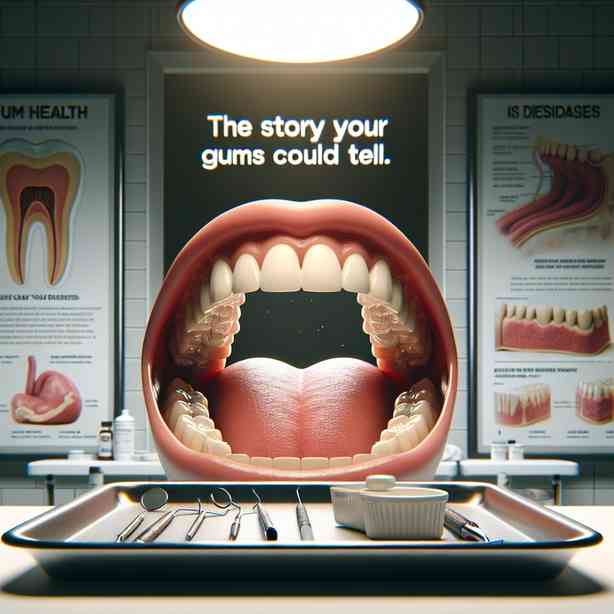
The health of our gums often goes unnoticed until symptoms manifest. The foundation of dental care involves not just our teeth but also our gums, which support and protect them. The story your gums could tell is one that reflects our overall health, lifestyle choices, and the importance of preventive care. Throughout this discussion, we will delve deeply into the various aspects of gum health, what our gums can reveal about our wider health, and the best practices for maintaining gum vitality.
Gums are made of soft tissue that covers the bone holding our teeth in place. They play a crucial role in oral health by acting as a protective barrier against bacteria and infections. Healthy gums are typically firm, pink, and resilient. However, they can suffer from various issues such as gingivitis and periodontitis, which can lead to tooth loss if not addressed promptly.
Gingivitis is a common and mild form of gum disease characterized by swelling, redness, and bleeding when brushing or flossing. It is often caused by poor oral hygiene that allows plaque, a sticky film of bacteria, to build up on teeth and harden into tartar. Conversely, periodontitis is a more severe infection that damages the soft tissues and destroys the bone supporting the teeth. This progression from gingivitis to periodontitis underscores the importance of early intervention and consistent dental care.
What our gums reveal about our health extends beyond oral hygiene. Research has shown a correlation between gum disease and various systemic conditions such as diabetes, heart disease, and respiratory illness. For instance, individuals with diabetes are more susceptible to infections, which can exacerbate gum disease. Likewise, the bacteria associated with periodontal disease can enter the bloodstream, potentially leading to inflammation in other parts of the body, including the heart.
Furthermore, the lifestyle choices we make significantly impact our gum health. Smoking has been identified as a major risk factor for gum disease because it weakens the immune system and impedes blood flow to the gums. A diet lacking in essential nutrients can also contribute to gum problems. Vitamin C is particularly crucial for gum health; a deficiency can lead to scurvy, characterized by swollen and bleeding gums.
Regular dental visits are essential for maintaining gum health. Dentists can perform professional cleanings to remove plaque and tartar that regular brushing cannot eliminate. They will also assess your gum condition during routine check-ups, allowing for early detection of any issues. The American Dental Association recommends visiting the dentist every six months, although people with existing gum disease may require more frequent appointments.
In addition to professional care, daily routines play a pivotal role in gum health. Brushing at least twice a day and flossing daily are foundational practices. Using toothpaste that contains fluoride can help protect against cavities and gum disease. Moreover, supplements or mouth rinses that contain antimicrobial properties can further aid in reducing gum inflammation and infection.
Another imperative aspect to consider is the role of stress management in gum health. Stress can lead to neglect of proper oral hygiene, resulting in bacterial growth that can cause gum disease. Furthermore, stress can promote teeth grinding, which puts additional pressure on the gums and supporting structures of the teeth. Incorporating stress-reducing activities into daily routines, such as yoga or meditation, can positively influence oral health.
The experience of pregnancy also highlights how hormonal changes can affect gum health. Many women experience pregnancy gingivitis due to increased hormone levels, making gums more susceptible to inflammation and bleeding. It’s crucial for expecting mothers to maintain consistent dental care and communicate any concerns with their dentist, as untreated gum issues can have consequences for both the mother and the baby.
Given the intricate relationships between gum health and overall well-being, it’s essential for individuals to approach their oral care holistically. At-home care combined with regular dental check-ups creates an effective strategy for maintaining healthy gums. Educational efforts to raise awareness about the symptoms and risks associated with gum disease can empower individuals to take proactive steps in their own healthcare.
In conclusion, the story your gums could tell is one of health, diligence, and interconnectedness. Healthy gums are not merely about preserving teeth; they are a window into overall health and wellness. By understanding the pivotal role gums play, recognizing the signs of gum disease, and implementing preventive measures, we can take significant steps toward achieving lasting oral health. Regular dental visits, proper brushing and flossing techniques, a balanced diet, and stress management are all vital components of gum care. As we prioritize our gum health, we simultaneously nurture our overall wellbeing, paving the way for a healthier future. Ultimately, listening to what our gums tell us—and taking action—can profoundly impact our lives and experiences.


